Afghanistan agony haunts November 11, 2010 ..
Nov 10th, 2010 | By L. Frank Bunting | Category: In Brief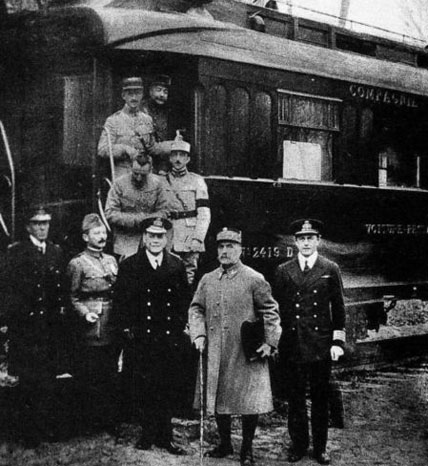
“This photograph was taken after reaching an agreement for the armistice that ended World War I,” at Compiègne, France. The railway car was given to French Field Marshall Ferdinand Foch “for military use by the manufacturer, Compagnie Internationale des Wagons-Lits. Foch is second from the right.”
According to the sometimes (if of course far from always) quite good Wikipedia, “‘O Valiant Hearts’ is a hymn remembering the fallen of the First World War.” And, technically so to speak, the at least beginning of the end of the First World War in a railway car at Compiègne, France, on November 11, 1918, is what we in Canada and other such places will be respectfully commemorating tomorrow, some 92 years later.
It is a sign of the times, however, that in 2010 the most impressive Canadian version of “O Valiant Hearts” on You Tube forms background music to “A Tribute and Remembrance Video for the Canadians fighting in Afghanistan.” (I cannot resist noting as well that this otherwise fine performance of the great hymn does not include the lump-in-your-throat thump from a big bass drum on the first beat of the seventh bar, that my high-school football band was passionately instructed to insert by a grizzled old soldier in the early 1960s. But this is a quibble, at best.)
It seems another sign of the times to try to pretend that the already over-extended international conflict (aka “occupation”) in Afghanistan today is somehow on the same wavelength as the First and Second World Wars. Yet while all who die for our country certainly deserve our equal vast respect and gratitude, “156 Canadiens y ont perdu la vie jusqu’ici” in Afghanistan (some say 152: presumably the difference involves strictly military and war-related civilian deaths?). There were, according to Wikipedia again, 66,944 Canadian deaths in the First World War (of both sorts), and 45,400 in the Second World War – even though neither conflict went on at all as long as the one in Afghanistan has now.
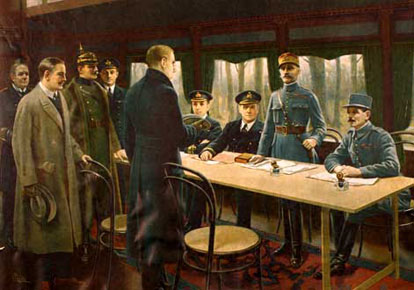
Colorized photograph inside Field Marshall Foch’s railway car at Compiègne, November 11, 1918. From left to right: German Admiral Ernst Vanselow ; German Count Alfred von Oberndorff of the Foreign Ministry ; German army general Detlof von Winterfeldt ; British naval captain J.P.R. Marriott ; head of the German delegation and member of the Reichstag, Matthias Erzberger ; British Admiral George Hope ; British First Sea Lord Sir Rosslyn Wemyss ; Field Marshall Foch ; and French general Maxime Weygand.
Whatever else, as these numbers make clear, the collective magnitudes of sacrifice are not even remotely comparable. But part of the logic behind the current attempt to make Afghanistan and the two world wars appear at least in some respects vaguely similar, no doubt, is an increasingly broad consensus – among more and more of our various ruling elites – that the Canadians, like the British and the Dutch and the Poles and other stalwart allies of the United States, are just going to have to stay the course in the mission to somehow save the not-so-popular Hamid Karzai Afghan government from itself, a little while longer.
Lengthening Canadian Forces’ stay in Afghanistan until 2014?
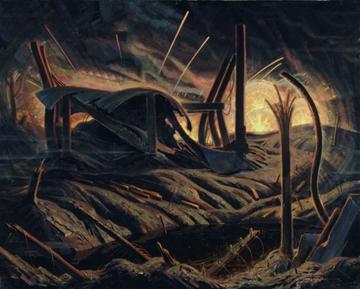
Ordnance depot, Harold Beament (1898-1985): “an attempt to produce the sensation of 'all Hell breaking loose' which arises when trouble has begun in an ordnance depot.” Undated Second World War, Beaverbrook Collection of War Art, Canadian War Museum 19710261-1041.
For some time, even the Harper Conservative minority government has been saying that, come hell or high water, Canada would be out of Afghanistan by next year.
But now, on the eve of Remembrance Day, November 11, 2010, we are being told that: “The Conservative government is considering lengthening the Canadian Forces’ stay in Afghanistan until 2014, rather than the proposed exit date of July 2011. This would keep some 600 Canadians in Kabul to train Afghan troops. Prime Minister Harper is expected to decide as soon as next week about the three year extension. Harper is currently facing pressure from NATO allies to help address a shortfall in the NATO-led mission in Afghanistan.”
Both the Globe and Mail and the Calgary Herald have come out with editorials in support of this 2014 extension. And before you roll your eyes too much about all the usual suspects, note how the Toronto Star has also urged that “the Liberal opposition in Parliament can hardly object on principle. Michael Ignatieff voiced support for a ‘continued mission’ in June, soon after Bob Rae returned from an Afghan tour arguing that we should ‘see this thing through’ and consider a training role … Canadians, like many Americans and British, are weary of this war … But there’s a strong argument to be made for not abandoning the Afghans just as they are struggling to shoulder the security burden themselves.”
The October 28, 2010 issue of the typically quite progressive New York Review of Books similarly included an article on “The War with the Taliban” by Christopher de Bellaigue – ostensibly a review of Thomas Barfield’s “impressive new Afghanistan: A Cultural and Political History.”
Mr. de Bellaigue “was born in London in 1971 and has worked as a journalist in the Middle East and South Asia since 1994 … He lives in Tehran with his wife and two children.” He spent some time in Afghanistan, talking to many different people, this past summer. He believes that pro-US-military analysts like Max Boot, who are “hopeful” about the current “surge” against the Taliban, “particularly if corrupt officials can be excluded from local government,” are just whistling Dixie. As de Bellaigue sees things: “A more realistic version of events–one that I heard often in Afghanistan–contends that the military tactics being applied in Kandahar and Helmand are no substitute for a political strategy.”
At the same time, even Christopher de Bellaigue believes that “personal security” is still “the most important issue facing Afghans today.” On both this and the “political strategy” fronts, right now “the sight of Obama’s military allies rushing for the door” is not helpful. (And, de Bellaigue also noted, when he finished his article this past September 29: “The Dutch withdrew their contingent in the summer, and the Canadians and Poles plan to follow suit.”)
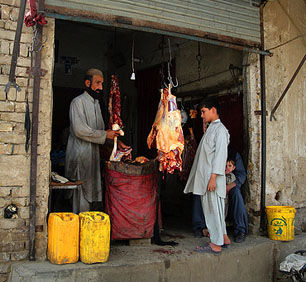
Life continues in Kandahar province despite challenging security circumstances. Every day, this man sells meat at the market. June 2010.
It is certainly true, de Bellaigue believes, that: “If a political process is to stand a chance of succeeding, the fighting needs to end or diminish significantly.”
Yet it is also true that “Afghans associate bureaucratic arrogance and corruption with the Karzai government … They also associate corruption with the occupation. But the occupation is needed to prevent the country from collapsing into civil war on a much larger scale than is currently the case, and there is no obvious and appealing alternative to the Karzai government. Were the Americans to leave Afghanistan, it is likely that Tajik warlords would take power in Kabul, leading to an intense and disastrous struggle with the Taliban and their allies in the south.”
Old doubts remain: why are we in Afghanistan again?
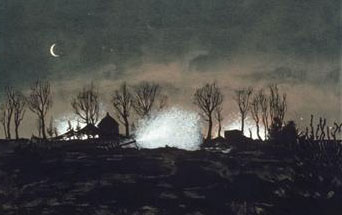
Before Zero Hour, Alex Colville (b. 1920): “"I arose at 0500 hours on 8 February ... and I watched medium guns firing the barrage that preceded Operation Veritable ... part of the battle for Normandy.” Painted in 1945, Beaverbrook Collection of War Art, Canadian War Museum 19710261-2031.
Personally, I continue to have a lot of sympathy for the views of we ordinary Canadians, who are interested in and concerned about our country’s foreign policy, but are not military or diplomatic experts, and have never visited Afghanistan ourselves.
As I write, the online edition of the Halifax Chronicle Herald is asking interested readers: “Should Canadian troops remain in Afghanistan in any role after 2011?” As of 12:30 PM, Wednesday, November 10, 2010, 74% of almost 4,000 respondents are answering “No.” Only 26% of this sample, in other words, would support the kind of “lengthening the Canadian Forces’ stay in Afghanistan until 2014, rather than the proposed exit date of July 2011,” that Stephen Harper’s minority government in Ottawa is now considering (with potential support in principle from the Liberal official opposition).
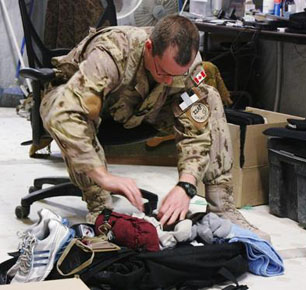
Canadian Capt. Yves Desbiens, a media liaison officer, sorts and catalogs the personal effects of slain Canadian journalist Michelle Lang in the media tent at Kandahar Airfield in Afghanistan on Saturday, January 2, 2010. Desbiens helped arrange the excursion for Lang in which she and four soldiers were killed by a roadside bomb on December 30, 2009. AP Photo/The Canadian Press, Colin Perkel.
To me, this isn’t just war weariness on the part of the democratic majority. It’s also the sort of common sense that makes the concept of vesting ultimate sovereignty in we the common people a recipe for ultimate political success (or, as Winston Churchill is alleged to have once described democracy: “the worst system of government, except for all the others”).
The recent Globe and Mail editorial in support of “lengthening the Canadian Forces’ stay in Afghanistan until 2014” I (ostensibly in a “non-combat role”), eg, urges that, this way, “Canadians can be confident that they will continue to play their part in rebuilding the country and ensuring that it no longer harbours international terrorists.” Yet, as Christopher de Bellaigue has explained, over the past nine years the Americans and their various NATO allies have already “driven most al-Qaeda operatives from Afghanistan so that fewer than one hundred remain.” (And “al-Qaeda” here is presumably the proper technical term for what the Globe and Mail more vaguely alludes to as “international terrorists.”)
This past August ordinary Canadians who pay attention to such things (as more than a few apparently do) could also read that “CIA: Al Qaeda in Yemen Now Biggest Threat … Washington Post: Agency Says Offshoot May Supersede Core Organization Based in Pakistan … For the first time since the Sept. 11, 2001, attacks, CIA analysts see one of al-Qaeda’s offshoots –Â rather than the core group now based in Pakistan – as the most urgent threat to US security, officials said.”
And then after the very latest failed international terrorist assault on North American soil just last month, we heard: “Obama Vows to ‘Destroy’ al Qaeda in Yemen After Bomb Discovery … President Obama … vowed to ‘destroy’’ al Qaeda in Yemen after two explosive devices were found aboard US-bound cargo jets … The apparent destinations for the two explosive packages, which authorities disabled, were two Jewish synagogues in Chicago, although the president did not specify which ones. At a White House news conference, Obama called the plot a ‘credible terrorist attack against our country’ and vowed that counterintelligence agencies would ‘take whatever steps are necessary’ to prevent an attack.”
Obama’s war now: a final more subtle and tricky political argument?
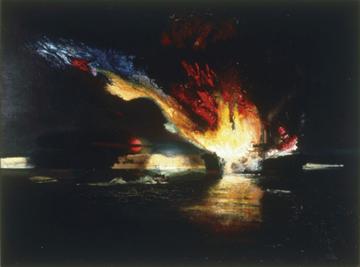
Light coastal forces blow up an enemy merchantman, Richard Eurich (1903-1992). Painted in 1943, Beaverbrook Collection of War Art, Canadian War Museum 19710261-6082.
So … for the most part, the altogether serious “international terrorists” have already left Afghanistan. Why are we still there? It is next door to Pakistan, but if that’s the point why not do something directly about Pakistan – or concentrate on the current big action in Yemen, and leave at least Afghanistan alone? Scepticism on this front may account for the results of the Globe and Mail’s own recent online poll, alongside its editorial on “The job in Afghanistan is not yet done.” This more specifically asked “Should Canadian troops remain in Afghanistan past 2011 to conduct non-combat training missions?” As of the last update on “Wednesday, Nov. 10, 2010 1:05 PM EST,” only 37% of less than 3500 respondents had answered “Yes.” Here as in so many other current opinion polls, a convincing enough majority of Canadians (63%) continue to believe Canadian forces should leave Afghanistan next year, as planned.
As for what the Globe and Mail editorial calls “rebuilding the country,” what can that possibly mean? Is it about the Taliban, which while not at all the same as al Qaeda , is certainly something that I don’t want to have anything to do with myself, here in Canada, where I live and of which I am a proper citizen, etc.?
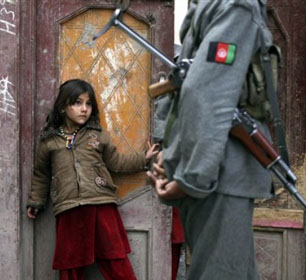
An Afghan girl looks out from her doorway at an Afghan National Army soldier searching an area used recently as a firing position by Taliban militants, during a joint US-Afghan patrol in the Pech Valley, Kunar province, northeastern Afghanistan, January 2010. AP Photo/Brennan Linsley.
But again de Bellaigue tells us: “The parliamentary elections of September 18 were severely tarnished by Taliban intimidation of voters, including bombings and other attacks on polling stations, allegations of major fraud, and a much lighter turnout than last year’s scandalously manipulated presidential election.” Yet: “With or without the Taliban, Afghan society is deeply conservative and patriarchal, and it will take years of patient effort before it becomes less so.” How can it seriously be any reasonable responsibility of Canadians to make this effort – even if there are a few Afghans who may actually want our help? Isn’t this Afghanistan’s own struggle? Would we want Afghans (and perhaps Pakistanis too, and other such allies?) occupying Canada with armed troops and trying to tell the cross-country English-speaking majority how to deal with the French-speaking majority in Quebec?
Yet you can still say, it seems, that there remains a final more subtle and tricky political argument that the larger democracy in countries like Canada has still not yet quite digested. Thomas Walkom hints at it, rather broadly but effectively enough, in today’s Toronto Star: “US President Barack Obama wants to start withdrawing his troops next year from a deeply unpopular war … But to make such a withdrawal politically palatable, he must be able to pretend that the US is winning – or, at least, not losing … That requires an Afghan government and army able to survive for at least a few months after the Americans pull out. A replay of the Vietnam War’s 1975 finale – with enemy troops entering the capital as helicopters airlift Americans from their embassy roof – would squelch any chance of an Obama second term … In Vietnam, the process of building up an indigenous army was called Vietnamization. In this war, it is called training. But it’s the same thing. And Washington desperately wants allies like Canada on side.”
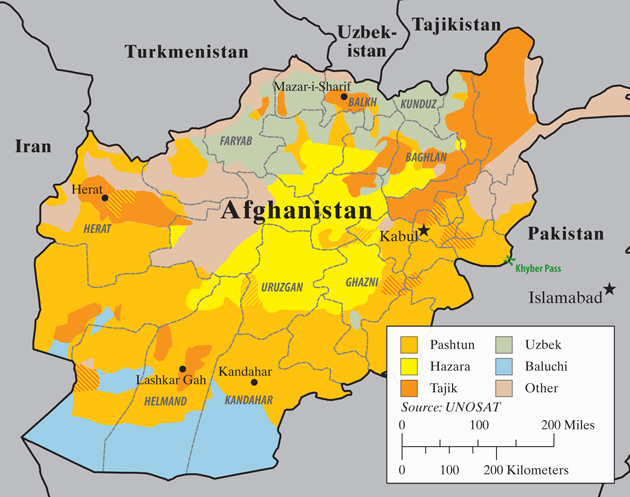
An approximate map, based on UNOSAT data, of Afghanistan's major ethnolinguistic groups; striations, or lined patches, indicate mixed areas. Mike King, New York Review of Books.
Personally, an argument of this sort just might convince me. Canada needs to stay in Afghanistan a few more years, in some so-called non-combat training role, to help President Obama finally pull the USA out. (This is presumably the kind of argument that appeals to Canadian Liberals like Bob Rae?) But the very last few sentences of Christopher de Bellaigue’s October 28 article in the New York Review of Books raise still further sober second thoughts:
“The best that can be hoped for is that changes in American policies will help Karzai press for political reconciliation, and that new partnerships will be formed that express the interests of Afghanistan’s different communities and their shared yearning for peace … In the meantime, the war intensifies, with no sign of real victory in sight. The errors of the past–installing Karzai, imposing a centralized system that barely takes into account local power structures, tolerating vast corruption–have made the war harder for the US to fight. It is far from clear that Obama has the vision and courage–or the political support at home and among US allies–to devise policies that can end it.”
Meanwhile, back at the village of small huts …
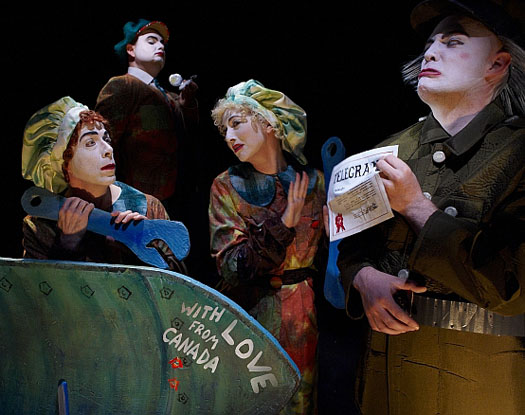
“There's far more to the Canadian story involving WWI than what most history books will share with you ... 'The Great War,' leaves no stone unturned ...”
Left to my own thoughts and devices, I think I probably still agree with Thomas Walkom in the very end. Strictly as a logical argument, the proposal to lengthen the Canadian Forces’ stay in Afghanistan until 2014, rather than the proposed exit date of July 2011 – even in some so-called non-combat role (and even if this is practically possible) – remains “a bad idea.”
Yet from the standpoint of raw political analysis – at least trying to predict what will likely enough happen – my guess would be that there is a very good chance the lengthened-stay policy will be in place soon enough. Or, in the current circumstances of Canadian federal politics, anything that both Stephen Harper and Bob Rae agree on (and Michael Ignatieff as well of course) is very likely to actually happen. And if this does prove to be the future, I will just hope more fervently that it somehow does help Barack Obama to get the USA out of Afghanistan soon enough – and get re-elected in 2012.
Meanwhile, as a kind of in-person bow to both Remembrance Day 2010 and Canada’s role in Afghanistan, last night I attended, along with some history-minded colleagues, the current revival of “The Great War, 1914—1918 … one of Michael Hollingsworth’s remarkable, 21-play series called ‘The History of the Village of the Small Huts,’ charting the history of Canada” – at the back of the Cameron House in Toronto. I enjoyed it more than I thought I might – and found it more instructive and illuminating too. I have seen other plays in the series in the past. And I finally agreed with a recent Toronto Star reviewer: Going to a Hollingsworth production “after a longish absence is a bit like running into … eccentric old” friends. “They may be a bit strange but they are not strangers, and it’s great to see them again, particularly if they are in good form” (which the cast at the back of the Cameron House “Oct-Dec, 2010” certainly is).
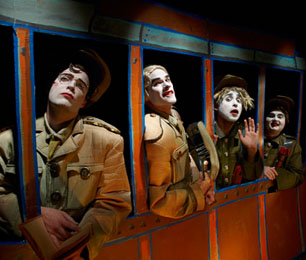
“Michael Hollingsworth’s take on Canadian involvement in the First World War ... follows the men on the battlefield as well as the self-serving clowns on Parliament Hill ... we follow four of the characters into the trenches and see the tragedies ... post-traumatic stress syndrome didn’t begin with Vietnam.”
The whole thing also left me feeling (or perhaps understanding is the better word) that there were more than a few aspects of Canada’s involvement in the First World War which made no more sense than our current involvement in Afghanistan. I was struck as well by a short “Playwright’s Note” in the printed program: “Canada is state-of-the-art colonialism – perfect, immaculate, pure. Double think is a seminal characteristic of Canadian citizenship. Blink your eyes and you’re a nation, blink your eyes and you’re a colony. Blink your eyes …” (And this sad but continuing local political truth probably has more than a little to do with why we likely will be staying in Afghanistan for a few more years now too?)
UPDATE NOVEMBER 11, 2010: So it did not take long at all for the good news to be officially announced. See, eg: “Harper confirms Canada to leave ‘trainers’ in Afghanistan” ; and “Harper confirms Afghan extension, decided with ‘reluctance’.”
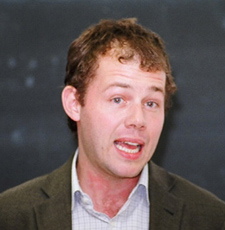
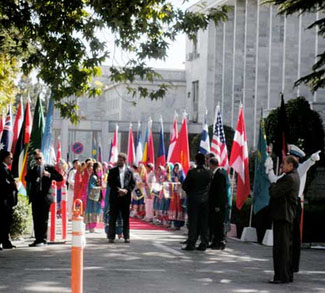


[…] the original post: Afghanistan agony haunts November 11, 2010 .. – Counterweights Share and […]
http://afghanistantoday.co.cc/?p=76299
Absolutely brilliant post guys, been following your blog for 3 days now and i should say i am starting to like your post. and now how do i subscribe to your blog?
FROM CW EDS: Just click on “Entries (RSS)” under “Stay informed” on the home page and take it from there (as you probably know already?).